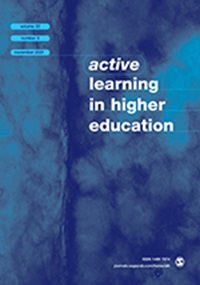自我评估和随着时间的推移会发生什么:学生和员工的观点,期望和结果
IF 3.8
1区 教育学
Q1 EDUCATION & EDUCATIONAL RESEARCH
引用次数: 0
摘要
自我评估及其帮助学习者发展评估判断的能力带来了多种好处。然而,学生和教职员工的看法以及在整个自我评估过程中的期望值得进一步审查,尤其是在研究生阶段。为了了解学生如何将自我评估作为一项新技能,本研究考察了研究生和教职员工的经验观察,他们实施了旨在改进评估和反馈程序的自我评估干预。学生们被邀请在提交作业前对自己的书面作业进行自我评估。标记随后对作品进行了评分,为了提供有用的比较,在反馈中加入了关于学生自我评估的评论。来自两个研究生单元的学生随后完成了一项在线调查(n = 42)描述他们对自我评估过程的印象和见解。为了扩大调查结果,六(n = 6) 被随机选择参加深度访谈。教师被邀请参加单独的访谈(n = 5) 。自我评估以不同和具体的方式引发了学生和教职员工的批判性思维和反思。归纳主题分析通过多个子主题确定了与两个队列相关的关键领域。这些涉及(a)自我评估如何挑战评估任务的习惯方法,(b)提供和接收越来越有意义的反馈的能力,以及(c)需要初始教学支持和持续指导资源。考虑嵌入自我评估的教育工作者将从结果中发现对单元规划和未来评估设计有用的见解。本文章由计算机程序翻译,如有差异,请以英文原文为准。
Self-assessment and what happens over time: Student and staff perspectives, expectations and outcomes
Multiple benefits have been attributed to self-assessment and its ability to help develop evaluative judgement among learners. However, student and staff perceptions and what to expect throughout the self-assessment process deserves further scrutiny, particularly at the postgraduate level. To understand how students engage with self-assessment as a new skill, this study examined the experiential observations among postgraduate students and the teaching staff who implemented a self-assessment intervention designed to improve assessment and feedback procedures. Students were invited to self-assess their own written assignments prior to submission. Markers subsequently graded the work, and to provide a useful comparison, incorporated comments regarding the students’ own self-assessment within the feedback. Students from two postgraduate units subsequently completed an online survey (n = 42) describing their impressions and insights regarding the self-assessment process. To expand upon survey findings, six (n = 6) were randomly selected to participate in in-depths interviews. Teaching staff were invited to participate in separate interviews (n = 5). Self-assessment triggered critical thinking and reflection among students and staff alike in different and specific ways. Inductive thematic analysis identified key domains relevant to both cohorts with multiple sub-themes. These related to (a) the ways self-assessment challenged habitual approaches to assessment tasks, (b) the capacity for providing and receiving increasingly meaningful feedback and (c) the need for initial teaching support and resources for ongoing guidance. Educators considering embedding self-assessment will find insights arising from the results useful for unit planning and future assessment design.
求助全文
通过发布文献求助,成功后即可免费获取论文全文。
去求助
来源期刊

Active Learning in Higher Education
EDUCATION & EDUCATIONAL RESEARCH-
CiteScore
13.20
自引率
12.00%
发文量
31
期刊介绍:
Active Learning in Higher Education is an international, refereed publication for all those who teach and support learning in higher education (HE) and those who undertake or use research into effective learning, teaching and assessment in universities and colleges. The journal is devoted to publishing accounts of research covering all aspects of learning and teaching concerning adults in higher education. Non-discipline specific and non-context/country specific in nature, it comprises accounts of research across all areas of the curriculum; accounts which are relevant to faculty and others involved in learning and teaching in all disciplines, in all countries.
 求助内容:
求助内容: 应助结果提醒方式:
应助结果提醒方式:


